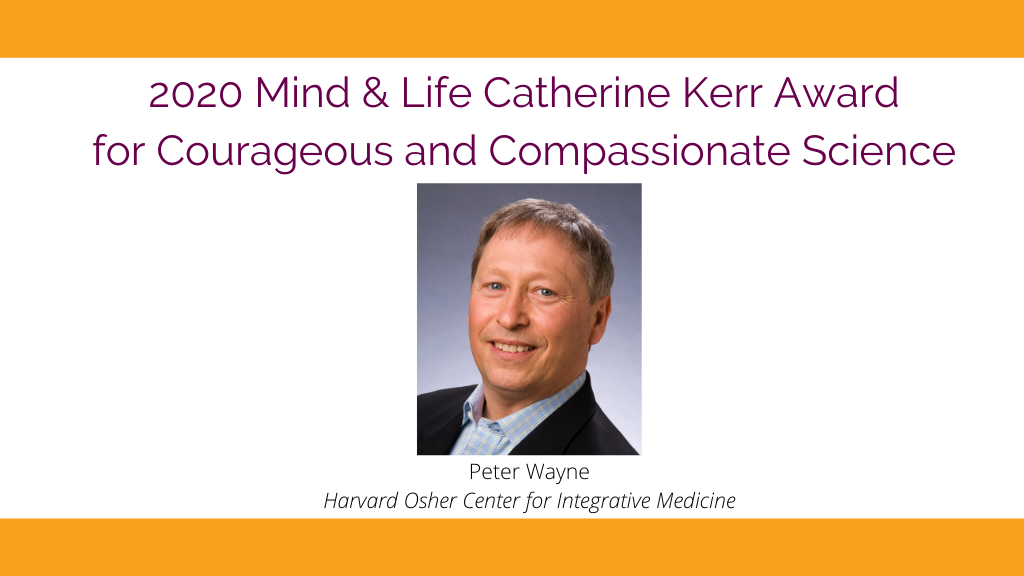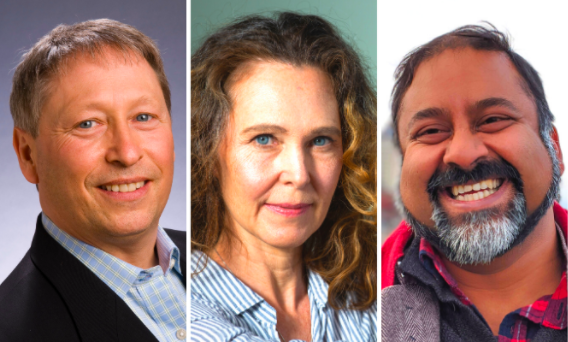
“What excites me is making connections,” says Dr. Peter Wayne, who has devoted much of his career to bridging Chinese medicine and Western science, the mind and body, research and practice.
As Director of the Osher Center for Integrative Health at Harvard Medical School and Brigham and Women’s Hospital, Peter oversees efforts to facilitate connections across Harvard’s 12 hospitals. By encouraging knowledge exchange across diverse disciplines, the Center seeks to advance integrative approaches to health and healing. “We are a center with no walls,” says Peter. “Our job is to connect people and make them realize they’re part of something bigger.”
In recognition of his many contributions to the field of contemplative science, Peter is being honored with the Mind & Life Institute’s 2020 Catherine Kerr Award for Courageous and Compassionate Science. The biennial award was established in remembrance of Cathy Kerr, a neuroscientist, whose research focused on the effects of attention practices such as Tai Chi and mindfulness on the mind and body. Cathy served as Director of Translational Neuroscience in the Contemplative Studies Initiative at Brown University until her untimely death in November 2016.
“Peter’s distinguished career includes teaching and studying the effects of ancient Chinese practices—Tai Chi and Qigong—on healing the human body, along with visionary leadership in the field of integrative medicine,” said Mind & Life President Susan Bauer-Wu. “He exemplifies many of the qualities Cathy brought to her work, including innovation, imagination, courage, and heartfulness.”
“Peter’s distinguished career includes teaching and studying the effects of ancient Chinese practices—Tai Chi and Qigong—on healing the human body, along with visionary leadership in the field of integrative medicine.”
On December 16 at 2:00 p.m. ET, Peter will deliver a special talk on how multidisciplinary perspectives have informed his research, teaching, and clinical practice as part of Mind & Life’s Inspiring Minds Series. Following, he and Buddhist scholar Lama Willa Blythe Baker will engage in heartfelt dialogue on the profound inner knowing that lies within the body.
“One of Cathy Kerr’s gifts was her willingness to explore where edges of often siloed traditions meet, and to mine the transdisciplinary wisdom that emerges through these connections,” says Peter. “In this tribute, I’ll share examples of how my own explorations along interdisciplinary edges have informed my academic pursuits in mind-body and integrative medicine research, as well as my personal path as a practitioner and teacher of Tai Chi and Qigong.”
Peter traces his interest in Chinese philosophy and the martial arts to his early teen years growing up in an immigrant family in New York City. “As a teenager, it was an arrow pointing to a whole new way of thinking and being,” he says. “As I trained and began teaching, it became a way of getting to know myself, and provided a tool to stay embodied and grounded while balancing out the challenges and stresses I encountered in my academic pursuits.”
A longtime Tai Chi and Qigong teacher and researcher, in 2013 Peter authored The Harvard Medical School Guide to Tai Chi. He has led or played a collaborative role on more than 25 studies funded by the National Institutes of Health, with his research being published in leading medical journals.
Peter speaks to his experiences as a teacher of Tai Chi and Qigong as offering a pathway to service and making a difference in other people’s lives. “What I love about these ancient wisdom practices is that they’re very ecological; they treat the whole person,” he says.
His research now centers on evaluating the effectiveness of Tai Chi and related complementary and integrative medical therapies for medical conditions, including balance disorders, Parkinson’s disease, cardiovascular health, osteoporosis, chronic pain, cancer, depression, and pulmonary disease.
In one recent study, his team investigated the effect of movement-based practices like Tai Chi on pain and negative emotions, such as shame, often experienced by breast cancer survivors. While women often entered the study with a poor self-image, over time, they would report making peace with their bodies, he shares. “These ancient wisdom practices really penetrate the whole system,” he adds. “It’s not about replacing this part or applying this drug.”
Drawn to what he calls the dance between the laboratory and the classroom, Peter sees the two informing one another. “It’s easy for us to sit in our office and design a study but unless we include our stakeholders and ask them what the problem is and what makes sense, we’re not going to get very far.”
Peter views his current role as Director of the Osher Center as an opportunity to bring the wisdom of ancient traditions “into the belly of academic medicine.” Mind & Life has played a similar role, he says, in bridging science and contemplative wisdom. More and more, what’s needed is an interdisciplinary approach to problem-solving, he says, that brings scientists, scholars, and practitioners together in addressing some of the big challenges facing our world.
Join Mind & Life on December 16, 2020 at 2:00 p.m. ET to learn more from Dr. Peter Wayne about frontiers in integrative medicine, while honoring the spirit and distinguished legacy of Cathy Kerr. Register now.


